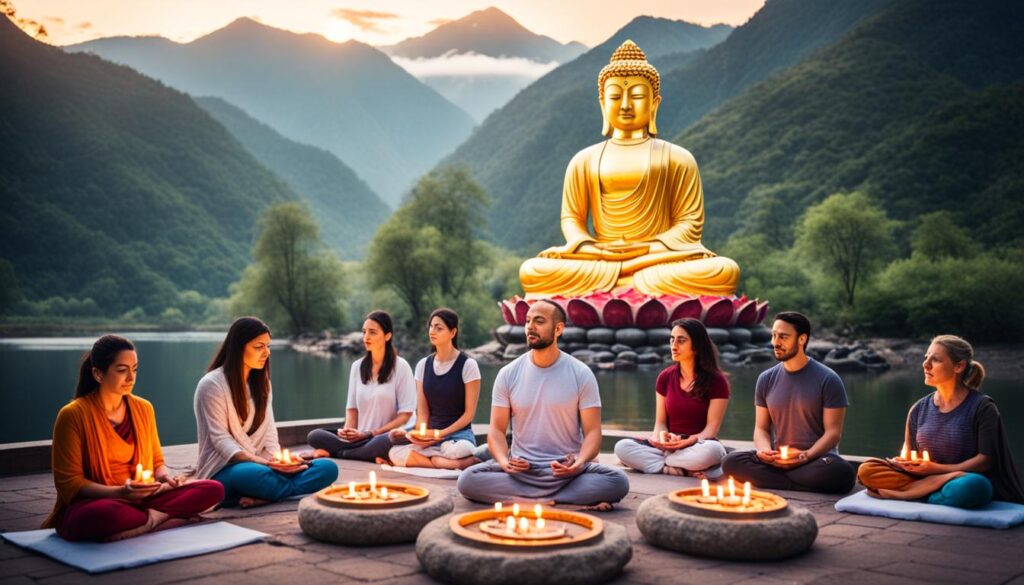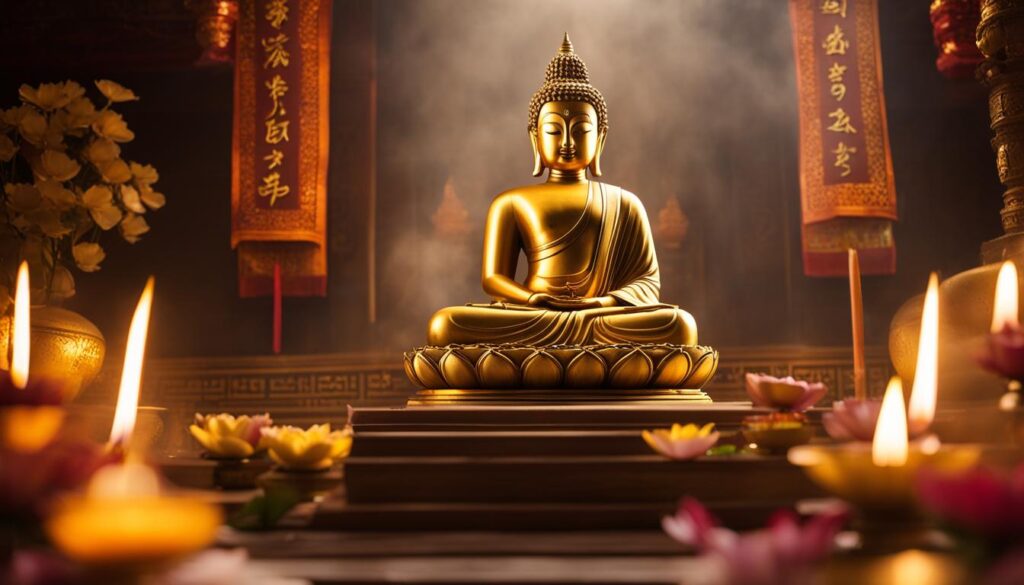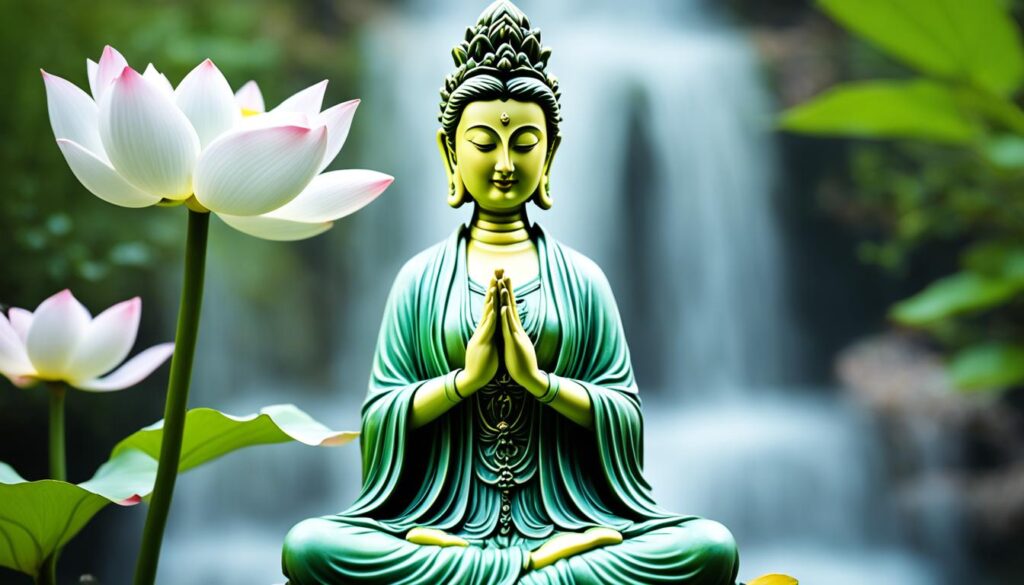Are you searching for inner peace and tranquility in your hectic life? Do you long for a practice that can calm your mind and nourish your soul? Look no further than Buddhism rituals. These ancient practices have been embraced by millions around the world, guiding them on a path of self-discovery and spiritual growth.
Key Takeaways:
- Discover the joy and celebration of Buddhist festivals, commemorating the Buddha’s life and teachings.
- Explore the significance of rituals in Buddhism and their role in cultivating virtues like mindfulness and compassion.
- Uncover the auspicious days in Buddhism that offer opportunities for deepening spiritual practice and community engagement.
- Connect with Guan Yin, the bodhisattva of compassion, for inner peace and harmony.
- Incorporate rituals and auspicious days into your daily life to enhance your spiritual journey and find solace.
The Significance of Buddhist Festivals
In Buddhism, festivals hold great importance as they provide an opportunity to remember and celebrate significant events in the life of the Buddha. These festivals, which vary across different Buddhist traditions, involve various rituals and practices that allow followers to deepen their connection with the teachings of the Buddha.
During Buddhist festivals, ceremonies, readings, meditation, and even pilgrimages are undertaken to honor and commemorate key moments in the Buddha’s life. These festivals serve as a reminder of the profound impact the Buddha’s teachings have on the lives of his followers, inspiring them to walk the path of enlightenment.
One of the most important Buddhist festivals is Wesak, also known as Vesak or Buddha Purnima, which commemorates the birth, enlightenment, and passing of the Buddha. It is a joyous occasion marked by acts of generosity, meditation, and spiritual reflection.
Another significant festival is Parinirvana Day, observed to honor the Buddha’s final passing into Nirvana. It is a solemn occasion for followers to reflect on the impermanence of life and remember loved ones who have passed away.
Major Buddhist Festivals
| Festival | Significance |
|---|---|
| Wesak (Vesak) | Commemorates the birth, enlightenment, and passing of the Buddha |
| Parinirvana Day | Reflects on the impermanence of life and remembers the Buddha’s passing into Nirvana |
| Magha Puja | Marked by the spontaneous gathering of 1,250 arahants to receive teachings from the Buddha |
| Asalha Puja | Celebrates the Buddha’s first sermon after attaining enlightenment |
| Kathina Ceremony | An occasion for offering robes and other requisites to monastic communities |

Ritual Practices in Buddhism
In the realm of Buddhism, ritual practices hold immense significance in expressing emotions, nurturing relationships, and cultivating a rich spiritual life. These practices not only provide a means of connecting with the divine but also serve as powerful tools for personal growth and transformation. As you delve into the world of Buddhism, understanding and embracing the importance of ritual practice can greatly enhance your spiritual journey.
One of the most fundamental rituals in Buddhism is meditation. Through the practice of meditation, individuals can attain a state of deep inner stillness, cultivating mindfulness and self-awareness. Meditation allows us to quiet the mind, let go of distractions, and cultivate a sense of peace and clarity.
Chanting is another essential ritual in Buddhism. The act of reciting sacred texts or mantras creates a vibrational resonance that helps to focus the mind and purify the consciousness. Chanting enables us to shift our focus from the outside world to our inner selves, fostering a deeper connection with our spiritual nature.
Offerings, whether physical or symbolic, are a common ritual practice in Buddhism. By making offerings, such as flowers, incense, or food, we express gratitude and reverence for the teachings of the Buddha and the spiritual path we have chosen. These offerings serve as reminders of the impermanence of material possessions and the importance of cultivating generosity and detachment.
Prostrations, a physical gesture of humility and devotion, are yet another ritual practice in Buddhism. By bowing down and touching the ground with our forehead, we symbolize our surrender to the profound wisdom and compassion of the Buddha. Prostrations help us develop a humble attitude, eradicate ego-centered thoughts, and open our hearts to the teachings of enlightenment.
The Benefits of Ritual Practice
Engaging in ritual practice in Buddhism brings a multitude of benefits to the practitioner. Through regular participation in rituals, we can deepen our spiritual connection, find solace in times of turmoil, and maintain inner peace amidst the chaos of daily life. Ritual practice also serves as a means of purification, helping to cleanse the mind of negative tendencies and cultivate virtuous qualities.
By regularly engaging in ritual practices such as meditation, chanting, offerings, and prostrations, we foster qualities such as mindfulness, compassion, and wisdom. These virtues become integrated into our daily lives, guiding our thoughts, words, and actions, and shaping us into more mindful and compassionate individuals.
The transformative power of ritual practice lies in its ability to provide a sacred space for deep introspection, self-reflection, and spiritual growth. In the ritual space, we can let go of worldly concerns, connect with the essence of our true nature, and experience a profound sense of interconnectedness with all beings.
Unlock the transformative potential of ritual practices in Buddhism and embark on a journey of self-discovery and spiritual awakening. Embrace the power of meditation, the resonance of chanting, the symbolism of offerings, and the humility of prostrations. Allow these rituals to guide you towards inner peace, wisdom, and awakening.

Auspicious Days in Buddhism
Buddhists celebrate numerous auspicious days in addition to their everyday rituals, providing special occasions for deepening their spiritual practice and connecting with the wider Buddhist community. These significant days, based on the lunar calendar, hold great significance and offer unique opportunities for reflection, meditation, and engagement.
Let’s explore some of the important auspicious days in Buddhism:
Losar (Tibetan New Year)
Losar, commonly known as the Tibetan New Year, marks the beginning of the Tibetan lunar calendar. This joyous occasion brings communities together to celebrate with vibrant displays of cultural performances, rituals, and prayers. It is a time for renewal, purification, and setting positive intentions for the year ahead.
Chotrul Duchen (15 Days of Miracles)
Chotrul Duchen commemorates the 15 days during which the Buddha displayed various miracles to foster faith among his disciples. Buddhists engage in virtuous activities, such as circumambulating sacred sites, making offerings, and amplifying their spiritual practice to accumulate positive merits and cultivate compassion.
Saga Dawa Duchen (Month of Merits)
Saga Dawa Duchen honors the birth, enlightenment, and passing of the Buddha. Devotees engage in acts of generosity, observe ethical discipline, and intensify their practice of meditation, compassion, and wisdom. This sacred month grants immense spiritual merit to those who participate wholeheartedly.
Chokhor Duchen (First Turning of the Wheel of Dharma)
Chokhor Duchen celebrates the Buddha’s first sermon, known as the Turning of the Wheel of Dharma. Buddhists observe this day by studying the teachings, reciting sutras, and engaging in meditation and acts of kindness. It is an opportune time for deepening one’s understanding of the Buddha’s guidance and cultivating wisdom.
Tsongkhapa Day (Enlightenment and Parinirvana of Lama Tsongkhapa)
Tsongkhapa Day commemorates the enlightenment and parinirvana of Lama Tsongkhapa, the founder of the Gelug school of Tibetan Buddhism. Devotees offer prayers, make offerings, and engage in practices associated with Lama Tsongkhapa’s teachings, emphasizing compassion, wisdom, and the pursuit of enlightenment.
These auspicious days hold immense spiritual significance for Buddhists worldwide, providing opportunities for reflection, spiritual growth, and community connections. By understanding and embracing these meaningful occasions, Buddhists can deepen their spiritual journey and enhance their practice.

Connecting with Guan Yin for Inner Peace
Guan Yin, also known as the bodhisattva of compassion and the goddess of mercy, offers a profound path to inner peace and enlightenment. By connecting with Guan Yin’s benevolent energy, you can cultivate compassion, embrace wisdom, and find solace on your spiritual journey.
One of the ways to connect with Guan Yin is through the practice of cultivating compassion. Guan Yin epitomizes the compassionate nature of Buddhism, emphasizing the importance of empathy and kindness towards all living beings. By nurturing compassion in your heart and extending it to others, you align yourself with Guan Yin’s teachings and expand your capacity for love and understanding.
Practicing meditation is another powerful way to connect with Guan Yin’s energy. Through stillness and mindfulness, you can quiet the mind, open the heart, and deepen your spiritual connection. As you meditate, envision Guan Yin’s gentle presence surrounding you, offering guidance and support on your path towards inner peace.
In addition to meditation, engaging in prayer and rituals can also enhance your connection with Guan Yin. Through heartfelt prayers and devotional practices, you can create a sacred space for invoking Guan Yin’s blessings and seeking her guidance. Lighting incense, offering flowers, and reciting mantras are some examples of rituals that can deepen your connection with Guan Yin’s compassionate energy.
Embracing stillness is a central teaching of Guan Yin. In the midst of a busy and chaotic world, finding moments of stillness allows you to quiet the mind, recharge your spirit, and reconnect with your inner self. By creating space for stillness in your daily life, you can tune into Guan Yin’s tranquil presence and experience a profound sense of peace.
Letting go of attachments is another essential teaching of Guan Yin. By releasing the grip of attachment to material possessions, expectations, and desires, you can free yourself from suffering and cultivate a sense of contentment and inner freedom. Guan Yin’s teachings encourage us to recognize the impermanence of life and find peace in the present moment.
Lastly, finding a balance between yin and yang energies is crucial to achieving inner peace according to Guan Yin’s wisdom. Yin represents the feminine, receptive, and nurturing qualities, while yang represents the masculine, active, and dynamic aspects. Balancing these energies fosters harmony, allowing you to embrace the wholeness of your being and find equilibrium in your spiritual journey.
Connecting with Guan Yin for inner peace is a transformative and enriching experience. By cultivating compassion, embracing stillness, letting go of attachments, and balancing yin and yang energies, you can awaken the divine qualities within you and nourish your soul with Guan Yin’s loving guidance.
Guan Yin’s Teachings for Finding Solace
Guan Yin, the embodiment of compassion and mercy, imparts invaluable teachings that lead to profound solace and inner peace. Her wisdom guides us towards embracing the power of stillness, letting go of attachments, and harmonizing the yin and yang energies within us.
The Power of Stillness: In a world filled with chaos and distractions, Guan Yin’s teachings emphasize the significance of finding tranquility within ourselves. By cultivating moments of stillness through meditation and contemplation, we can silence the noise of the external world and connect with our inner being. In this serene state, we can experience a profound sense of peace and clarity.
Letting Go of Attachments: Guan Yin encourages us to release the grip of attachment, recognizing that attachment to desires, possessions, and outcomes can lead to suffering. By relinquishing our attachment to these transient elements, we open ourselves to the beauty of impermanence and cultivate an acceptance of the present moment. This detachment allows us to navigate life’s challenges with equanimity and find solace in the ever-changing nature of our existence.
Balancing Yin and Yang: Guan Yin teaches us the importance of harmonizing the contrasting energies of yin and yang. Yin represents the feminine, receptive, and nurturing aspects, while yang symbolizes the masculine, active, and assertive qualities. By embracing both energies within ourselves, we achieve a state of balance and wholeness. This balance enables us to navigate life’s ups and downs with grace, cultivating resilience and finding solace in the ebb and flow of existence.
By integrating Guan Yin’s teachings into our lives, we embark on a transformative journey towards inner peace, profound self-discovery, and spiritual growth. Let her wisdom guide you as you embrace the power of stillness, let go of attachments, and balance the energies within, for it is through these teachings that the path to solace becomes illuminated.

| Teaching | Description |
|---|---|
| The Power of Stillness | Cultivating moments of stillness through meditation and contemplation to find inner peace. |
| Letting Go of Attachments | Releasing the grip of attachment to desires, possessions, and outcomes for liberation and acceptance. |
| Balancing Yin and Yang | Harmonizing the contrasting energies of yin and yang to achieve a state of equilibrium and wholeness. |
| Practicing Compassion | Cultivating compassion towards self and others, fostering kindness and understanding. |
| Embracing Wisdom | Seeking knowledge, insight, and spiritual growth to nourish the mind, body, and soul. |
Incorporating Rituals and Auspicious Days into Daily Practice
To deepen your spiritual practice and strengthen your connection with Buddhist traditions, it is beneficial to incorporate rituals and observe auspicious days in your daily life. By integrating these practices into your routines and dedicating specific time and space for them, you can cultivate a deeper sense of spirituality and inner peace.
One way to incorporate rituals into your daily life is by incorporating simple acts into your routine. For example, you can start your day by lighting incense or a candle, creating a serene ambiance and symbolizing the purification of your mind. As you go about your day, you can repeat mantras or prayers, allowing these sacred words to resonate within you and bring focus and clarity to your thoughts.
Creating a dedicated altar in your home can further enhance your ritual practice. Your altar can be adorned with statues or images of Buddhas, bodhisattvas, or deities that resonate with you. You can also include meaningful objects, such as crystals, flowers, or offerings, to symbolize your devotion and gratitude.
It is important to recognize and observe auspicious days in Buddhism as well. These special days, based on the lunar calendar, provide opportunities for reflection, meditation, and community engagement. By scheduling specific practices on these days, you can align yourself with the spiritual energy and significance associated with them. It is also a time to connect with other practitioners and expand your understanding of Buddhist teachings.
Approaching rituals and auspicious days with an open heart and a readiness to learn is essential for incorporating them into your daily practice. By embracing these spiritual traditions and integrating them into your life, you can experience a greater sense of connection, peace, and mindfulness.
| Rituals for Daily Practice | Auspicious Days in Buddhism |
|---|---|
| Burning incense | Losar (Tibetan New Year) |
| Repeating mantras | Chotrul Duchen (15 Days of Miracles) |
| Lighting candles | Saga Dawa Duchen (Month of Merits) |
| Offering prayers | Chokhor Duchen (First Turning of the Wheel of Dharma) |
| Meditating | Tsongkhapa Day (Enlightenment and Parinirvana of Lama Tsongkhapa) |
By incorporating rituals and observing auspicious days in Buddhism, you can infuse your daily life with spiritual meaning and deepen your connection with the teachings and practices of Buddhism. Embrace these opportunities to nurture your spiritual growth, find solace in the present moment, and cultivate inner peace.
Conclusion
In conclusion, Buddhism rituals play a crucial role in the pursuit of inner peace. By engaging in these sacred practices, individuals have the opportunity to cultivate compassion, embrace stillness, and detach from worldly attachments. Through the observance of auspicious days, one can further deepen their spiritual journey and foster a sense of spiritual growth and community engagement.
By incorporating these rituals and traditions into daily life, you can establish a profound connection with Buddhist practices. Whether it’s through the simple act of burning incense or reciting mantras, these rituals can enhance your spiritual practice and bring about a sense of tranquility. Additionally, observing the significant days in the Buddhist calendar provides unique opportunities for personal development and reflection.
As you embark on your spiritual journey, remember that finding inner peace is a continuous process. It requires dedication, self-reflection, and a willingness to let go of attachments. By embracing Buddhism rituals and participating in auspicious days, you can discover solace, balance, and a deeper understanding of your own spiritual path. May your journey be filled with compassion, wisdom, and the serenity that comes from within.
FAQ
What are some important Buddhist festivals?
Buddhist festivals are a time of joy and celebration, offering Buddhists an opportunity to remember and celebrate the Buddha’s life and teachings. Some important Buddhist festivals include Wesak, which commemorates the Buddha’s birth, enlightenment, and passing, as well as Parinirvana Day, a solemn occasion to reflect on impermanence and remember loved ones who have passed away.
What are the ritual practices in Buddhism?
Ritual practices in Buddhism include meditation, chanting, offerings, and prostrations. These rituals are essential in expressing emotions, relationships, and spiritual life. They allow for the cultivation of virtues like mindfulness, compassion, and wisdom, helping individuals develop a connection with the divine, find solace, maintain peace, and purify the mind.
What are auspicious days in Buddhism?
Buddhists celebrate auspicious days in addition to everyday rituals. These days, based on the lunar calendar, offer opportunities to deepen spiritual practice and engage with the community. Some important auspicious days include Losar (Tibetan New Year), Chotrul Duchen (15 Days of Miracles), Saga Dawa Duchen (Month of Merits), Chokhor Duchen (First Turning of the Wheel of Dharma), and Tsongkhapa Day (Enlightenment and Parinirvana of Lama Tsongkhapa).
How can I connect with Guan Yin for inner peace?
Guan Yin, the bodhisattva of compassion, offers a path to inner peace. Cultivating compassion, practicing meditation, and engaging in prayer and rituals can help connect with Guan Yin’s benevolent energy. Embracing stillness, letting go of attachments, and finding a balance between yin and yang energies are essential teachings of Guan Yin for achieving inner peace.
What are Guan Yin’s teachings for finding solace?
Guan Yin’s teachings focus on the importance of stillness, letting go of attachments, and finding a harmonious balance between yin and yang energies. By embracing these teachings, one can discover inner peace, appreciate the present moment, and achieve personal growth and tranquility.
How can I incorporate rituals and auspicious days into my daily practice?
Incorporating rituals into daily routines, such as burning incense or repeating mantras, can enhance spiritual practice. Recognizing and observing auspicious days by scheduling specific practices and creating dedicated altars can deepen the connection with Buddhist traditions. Approaching rituals and auspicious days with an open heart and a readiness to learn is key to adopting them into daily practice.

